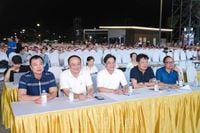In April 2025, the PgBootcamp conference showcased a series of insightful presentations focusing on PostgreSQL, a powerful open-source relational database system. This article reviews five notable talks from the event, highlighting key takeaways and recommendations for both new and experienced PostgreSQL users.
The PgBootcamp conference, which has gained traction since its inception, has now held three successful events in various locations, including Kazan, Minsk, and Yekaterinburg. Unlike many conferences where accessing all presentations can be challenging, PgBootcamp made its materials publicly available for download, allowing attendees and interested parties to revisit the discussions at their convenience. The archives are accessible via pgbootcamp.ru, where users can find video recordings, presentations, and scripts on GitHub.
One of the main draws of the PgBootcamp is its focus on practical applications of PostgreSQL, with organizers selecting talks that cover both innovative techniques and foundational knowledge. The conference format allows for both online and offline registration, providing flexibility for participants. Video presentations are uploaded to platforms like YouTube and RuTube, ensuring a wider audience can benefit from the insights shared.
Bruce Momjian, a prominent figure in the PostgreSQL community, welcomed attendees, emphasizing the importance of community-driven events. His remarks set the tone for a day filled with rich discussions and knowledge exchange.
The first talk I recommend is by Alexander Nikitin, titled "Working with Queries from the DBA Point of View." This presentation is particularly valuable for those looking to optimize their database queries. Nikitin provided a clear overview of practical tools and scripts available on GitHub, which can aid in PostgreSQL auditing. He emphasized the importance of understanding the intent behind queries before diving into optimization strategies. Notably, he debunked the myth surrounding the frequent need to gather statistics, advising instead to review existing data. His insights on the support limitations of Postgres Pro, which diverges from the vanilla PostgreSQL experience, were also enlightening. Nikitin's practical examples were well-received, and he concluded with recommendations for monitoring tools, such as DataEgret scripts tailored to specific tasks.
Next, Pavel Seleznev from Pangolin presented a talk on data compression techniques. His engaging delivery covered various algorithms, including zstandard and lz4, while also touching on the implications of compression for network transfers. Seleznev clarified that for small data blocks, high compression ratios may not yield significant benefits. His exploration of WAL and TOAST compression illustrated real-world applications, making the technical content accessible to a broad audience.
Another noteworthy presentation was "Upgrade of PostgreSQL and Greenplum Catalogs," which, while not directly about Greenplum, offered insights into code merging strategies. The talk highlighted the challenges faced by contributors after the Greenplum project closure and the emergence of new forks like Prosperity, developed by Arenadata. The historical context provided by the speaker helped attendees understand the evolution of PostgreSQL-related technologies and their relevance in modern applications.
The session on "How to Dig Out Data from Unreadable Tables" offered a practical approach to dealing with data corruption issues. The speaker's straightforward style made complex concepts easier to digest, and he introduced the utility pg_filedump as a solution for reading damaged data. This talk emphasized the importance of proper backup strategies and understanding the underlying causes of data integrity issues.
Finally, the presentation on changing table structures in PostgreSQL using the dbms_redefinition technology provided a step-by-step guide to minimizing downtime during schema changes. This approach, adapted from Oracle's Online Redefinition feature, presents a valuable strategy for database administrators looking to implement changes without significant service interruptions.
The PgBootcamp conference serves as a vital platform for knowledge sharing within the PostgreSQL community. As the database landscape continues to evolve, events like these play a crucial role in keeping professionals informed about the latest developments and best practices. The discussions and insights shared at PgBootcamp not only enhance individual skills but also contribute to the collective growth of the PostgreSQL ecosystem.
In conclusion, the PgBootcamp conference in April 2025 showcased a variety of talks that addressed both fundamental and advanced topics related to PostgreSQL. From query optimization to data compression and schema management, the presentations provided attendees with practical knowledge and tools to enhance their database management skills. As PostgreSQL continues to grow in popularity, such conferences will remain essential for fostering community engagement and professional development.

